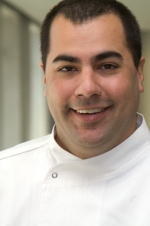Interview with Chef Lanny Lancarte of Lanny's Alta Cocina Mexicana - Dallas
Antoinette Bruno: Would you recommend culinary school to aspiring cooks?
Lanny Lancarte: I graduated from CIA in 2002. I would recommend school but I would strongly recommend that before going one spends one year in a working kitchen to see if it’s really where they want to be.
AB: Who are some of your mentors? What have you learned from them?
LL: Diane Kennedy because she has such a strong passion for food and treats raw produce with respect and integrity. I am also influenced by the work Rick Bayless does with authentic Mexican sauces.
AB: In which kitchens have you staged?
LL: I staged in both Rick Bayless restaurants: Frontera Grill and Topolobampo.
AB: What question gives you the most insight to a cook when you’re interviewing them for a position in your kitchen?
LL: I see people who come on recommendation from other chefs or restaurant people that I trust.
AB: Which chefs do you consider to be your peers?
LL: Chef David McMillan at 62 Main and Stephan Pyles, who isn't exactly a peer but who I really respect.
AB: Is there any ingredient that you feel is particularly under appreciated or under utilized?
LL: Brussels sprouts: they’re great on their own and are a really versatile accompaniment.
AB: What are a few of your favorite flavor combinations?
LL: I think pork and fish work well together, like braised pork belly with scallops, or braised oxtail with halibut.
AB: What’s your most indispensable kitchen tool?
LL: A good chef’s knife and an immersion circulator.
AB: Describe a technique that you have either created of borrowed and use in an unusual way.
LL: I use broths and soups when building my sauces; they add a lot of intensity and flavor.
AB: What are your favorite cookbooks?
LL: Anything by Alain Ducasse. There is so much in there but his focus on vegetables and ingredients is clean and sharp.
AB: Where would you like to go for culinary travel? Why?
LL: It changes weekly but I’d have to say Spain because I have never been. I would also like to go to Japan.
AB: What are your favorite restaurants-off the beaten path-in your city? What is your favorite dish there? What are your favorite after hour places and bars?
LL: M & M Steakhouse for the chicken fried steak and Esperanza’s (my grandmother’s bakery) for chorizo and eggs.
AB: What trends do you see emerging in the restaurant industry now?
LL: Molecular gastronomy, for good reason: it challenges chefs to try different things but I try not to lose my focus on the flavor of the food I create.
AB: Which person in history would you most like to have dinner with? What would you serve?
LL: Jimmy Hendrix because he seems like a pretty cool person to sit down with. I’d serve a tasting menu of my favorite dishes.
AB: What is your philosophy on food and dining?
LL: Multiple courses served at a slow and leisurely pace with unobtrusive service are all marks of good dining. I would expect to be at a table for four hours. Its also about who you are dining with; good company makes all the difference.
AB: If you weren’t a chef what do you think you’d be doing?
LL: Playing baseball professionally!
AB: What does success mean for you? What will it look like for you?
LL: Working in a restaurant that is full all the time and that tends to avoid major criticism. Longevity of a restaurant means your mission as a chef is accomplished.
AB: How are you involved in your local culinary community? Nationally/Globally?
LL: I work for charity events as much as I can. I am also trying to get a Chef’s Collaborative Chapter together.

Chef Lanny Lancarte
Lanny's Alta Cocina Mexicana3405 West 7th St.
Fort Worth, TX 76107
www.lannyskitchen.co..





